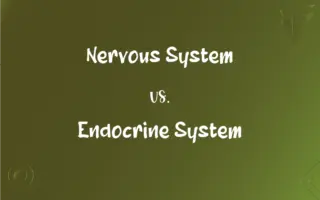Gift vs. Present: What's the Difference?
Edited by Janet White || By Harlon Moss || Updated on October 19, 2023
Both "gift" and "present" refer to something given without expectation of return, but "gift" often emphasizes the gesture, while "present" emphasizes the occasion.

Key Differences
"Gift" and "present" both refer to an item given to someone without expecting anything in return. They are often used interchangeably in everyday English. The act of giving a gift is seen as a gesture of goodwill, affection, or respect, conveying sentiment and appreciation.
On the other hand, "present" is often linked with specific occasions or events. Birthdays, anniversaries, and holidays often involve giving presents. The term emphasizes the moment or occasion of giving rather than the item itself. For example, during Christmas, one might give presents to family and friends.
The word "gift" can also denote a natural ability or talent someone possesses. For instance, a person might have a gift for music or painting. This usage is specific to the term "gift" and is not commonly associated with the word "present."
Another differentiation is in some of the idiomatic uses. For instance, "gift of gab" means a talent for speaking, and this phrase wouldn't be used with "present." Conversely, "at present" means "currently," a usage exclusive to the term "present."
Comparison Chart
Primary Use
Something given freely, emphasizing gesture.
Something given on a specific occasion.
ADVERTISEMENT
Secondary Meaning
A natural talent or ability.
Current time (e.g., "at present" means "now").
Idiomatic Usage
"Gift of gab," "gifted."
"At present."
Contextual Emphasis
Often emphasizes sentiment or thoughtfulness.
Focuses on the occasion or event of giving.
Synonyms
Donation, offering, endowment.
Surprise, token, keepsake.
Gift and Present Definitions
Gift
A natural ability or talent.
His voice was a true gift, captivating everyone who heard him sing.
ADVERTISEMENT
Present
Something that is offered or given.
He had a surprise present waiting for her.
Gift
A thing given willingly to someone without payment.
She gave him a gift to celebrate their anniversary.
Present
An item given to someone on a special occasion.
He bought a present for his daughter's birthday.
Gift
Something bestowed or acquired without being sought.
His photographic memory was a gift he had since childhood.
Present
Being in a particular place.
The whole family was present at the gathering.
Gift
An act of giving something as a token of appreciation or affection.
The necklace was a gift from her grandmother.
Present
A formal act of giving or awarding something.
They had the honor of present-ing the award to the winner.
Gift
A donation or contribution.
They made a generous gift to the charity.
Present
The period of time existing now.
At present, he is working on his new project.
Gift
Something that is bestowed voluntarily and without compensation
I received several gifts for my birthday. Your gift of $100 is greatly appreciated.
Present
A moment or period in time perceptible as intermediate between past and future; now.
Gift
The act of giving
The painting came into their possession by gift.
Present
The present tense.
FAQs
Is "present" often tied to occasions?
Yes, "present" is commonly associated with special events or occasions.
Are "gift" and "present" synonymous?
Yes, they can be used interchangeably in many contexts.
Can "gift" refer to a talent?
Yes, "gift" can denote a natural ability or talent.
Can "gift" be used as a verb?
Yes, "to gift" means to give something as a gift.
Do both "gift" and "present" emphasize the act of giving?
Yes, both emphasize the act, but "gift" often focuses on the gesture, while "present" on the occasion.
Is "birthday present" a common usage?
Yes, it's a common way to refer to gifts given on birthdays.
Is "gift" associated with specific cultural or religious ceremonies?
Yes, in some cultures or religions, "gift" can have specific ceremonial implications.
Can "present" be used in academic or formal settings?
Yes, "to present" can mean to formally introduce or display information, like presenting research.
What does "at present" mean?
"At present" means "currently" or "right now."
Can "present" refer to the current time?
Yes, "present" can denote the current time or moment.
What's a common idiomatic use of "gift"?
"Gift of gab" is an idiom referring to a talent for speaking.
What's an idiomatic use of "present"?
"Present oneself" means to appear or arrive at a particular place.
Are "gift" and "present" used globally in English?
Yes, both terms are widely understood and used in English-speaking countries worldwide.
Do both terms have a positive connotation?
Generally, yes. Both terms often convey positive feelings or intentions.
Can "gift" be used in legal contexts?
Yes, "gift" can refer to a transfer of property without compensation in legal contexts.
Can "present" also mean "introduce"?
Yes, "to present" can mean to introduce someone or something formally.
Is the act of giving a "gift" always tied to special occasions?
No, a "gift" can be given anytime, not just on special occasions.
Can both "gift" and "present" refer to a surprise?
Yes, both can be surprises, but "present" is more commonly used in this context.
Do both "gift" and "present" have verb forms?
"Gift" can be used as a verb, and "present" has a verb form with a different meaning, such as to introduce or show.
Can "gift" imply a donation?
Yes, "gift" can be used to refer to donations or offerings.
About Author
Written by
Harlon MossHarlon is a seasoned quality moderator and accomplished content writer for Difference Wiki. An alumnus of the prestigious University of California, he earned his degree in Computer Science. Leveraging his academic background, Harlon brings a meticulous and informed perspective to his work, ensuring content accuracy and excellence.
Edited by
Janet WhiteJanet White has been an esteemed writer and blogger for Difference Wiki. Holding a Master's degree in Science and Medical Journalism from the prestigious Boston University, she has consistently demonstrated her expertise and passion for her field. When she's not immersed in her work, Janet relishes her time exercising, delving into a good book, and cherishing moments with friends and family.































































